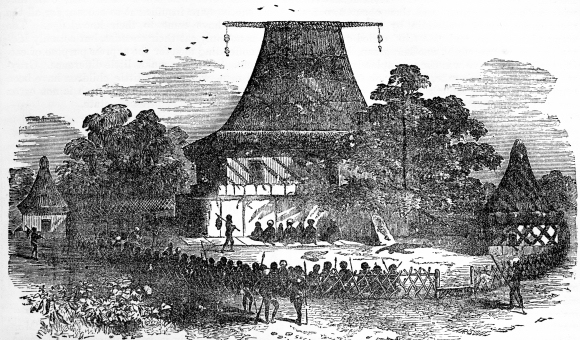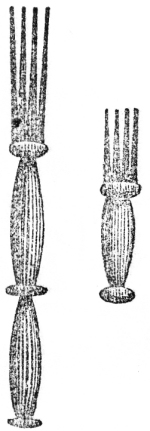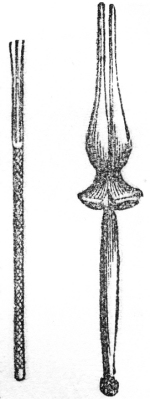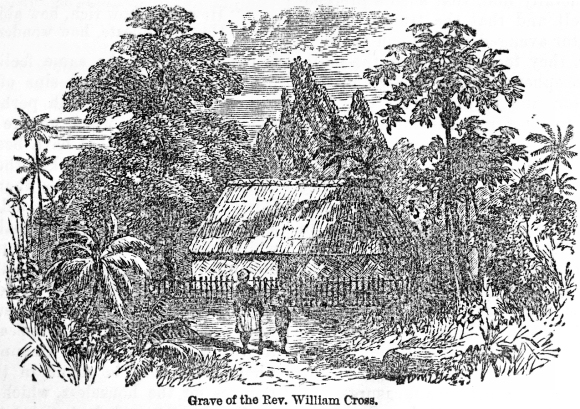
Na Vata-ni-Tawake, Mbau.
Hitherto we have looked at the Fijian's outward form,
and at the manifestations of his mental powers. We come now to the dark
side of the picture—his moral nature and its development. Alas that
where nature is so fair and man is so gifted, he should be found so
utterly vile! His story, told truly, would be filled with details of
cruelty and lust. A few facts gathered from the works of Erskine,
Wilkes, and Williams, will suffice as a sample. Be it remembered that
all these writers excuse themselves from giving the worst features of
the case; and that, from their selected instances, we cull the least
revolting.
One of the first lessons taught to the infant is to
strike its mother; and neglect of this would beget a fear that the child
would grow up a coward. Mothers teach their little children to kick and
tread upon the dead bodies of their enemies. Children taken in war are
tied to the stem of a tree, and form a mark for the spears and arrows of
the young boys of Fiji, while grown people look on and enjoy the cruel
sport. Sick persons, if they do not shew signs of recovery in two or
three days, are either left to perish, or are buried alive by their
friends. A poor girl lying in a weakly state, had her curiosity aroused
by an unusual noise outside her house. She made shift to crawl to the
door and look out, when she was instantly seized and thrown into her
ready-made grave. She shrieked, ''Do not bury me; I am quite well
now!"—but two men stood upon her body, while others threw earth into the
hole, and pressed it down till she ceased to move. The sick will
sometimes consent to their own premature interment. The following story
is told by an English sailor, who liyed for some years among the
natives:— "I walked into a Mbure, and saw a tall young man about
twenty years old. He appeared to be somewhat ailing, but not at all
emaciated. He was rolling up the mat he had been sleeping upon,
evidently preparing to go away somewhere. I asked him where he was
going, when he immediately answered that he was going to be buried. I
said 'You are not dead yet,' when he said he should soon be dead when he
was put under ground. I asked him why he was going to be buried. He said
it was three days since he had eaten anything,, and, consequently, he
was getting very thin; and, that if he lived any longer, he would be
much thinner, and then the women would call him a lila,
(skeleton,) and laugh at him. . . . By this time all his relations had
collected round his door; his father had a wooden spade to dig the
grave, his mother a new suit of tapa, his sister some vermilion
and a whale's tooth. He rose, took up his bed and walked, his friends
accompanying him. . . . When the grave was ready, he said, 'Before I
die, I should like a drink of water.' His father said, as he ran to
fetch it in a leaf doubled up, ' You have been a considerable trouble
during your life, and it appears that you are going to trouble us
equally at death.' The father returned with the water, which the son
drank off, and then looked up into a tree covered with tough vines,
saying he should prefer being strangled with a vine to being smothered
in the grave. His father became excessively angry, and spreading the mat
at the bottom of the grave, told his son to be a man, when he stepped
into the grave, which was not more than six feet deep, and lay down on
his back with the whale's tooth in his hands, which were clasped across
his body. The spare sides of the mat were then lapped over him, so as to
prevent the earth from getting to his body, and then about a foot of
earth was shovelled upon him as quickly as possible. His father
immediately stamped it" down solid, and called out, in a loud voice, 'Sa
tiko, sa tiko,' (You are stopping there,) meaning 'Good-bye,
good-bye.' The son answered with an audible grunt, and then about two
feet more earth was shovelled in by the father, and stamped as before,
and 'Sa tiko' called out again, which was answered by another
groan, but much fainter. The grave was then completely filled up, when,
for curiosity's sake, I said, 'Sa tiko,' but no answer was given,
though I fancied, or really did see, the earth crack a little on the top
of the grave. The father and mother then turned back to back on the
middle of the grave, and having dropped some kind of leaves from their
hands, walked away, in opposite directions, towards a running stream of
water hard by, where they, and all the rest, washed themselves, and then
we returned to the town, where a feast was prepared. As soon as the
feast was over, it being then dark, began the dance and uproar which are
always carried on either at natural or violent deaths." Old people are
constantly got rid of. At one of the islands, Commodore Wilkes, not
seeing any man more than forty years of age, asked where the old people
were, and was told "that they were all buried." Parricide is a social
institution. The use of the rope, instead of the club, is regarded as
the strongest mark of love. Widows are strangled at the death of their
husbands; remonstrance being earnestly deprecated, and seldom found to
avail anything. Sometimes when a king's house or other important
building is to be erected, living men are placed in the deep holes dug
for the insertion of the principal posts, and so buried. The notion is,
that while they remain in a sitting posture, with their arms encircling
the posts, the house stands safely. Being asked how men can hold up the
posts after death, the answer was, that if they make the sacrifice, and
hold as long as possible, the gods will take care afterwards. Captives,
taken in. war, have been placed between banana trees and used as
rollers at the launching of a chief's canoes. The English sailor, quoted
before, asserts that he once saw forty men so treated, and that, at the
distance of half a mile, he heard the cries of the wretched sufferers as
the crushing weight passed over them. "A Naitasiri chief was on a visit
at Makongai, attended by some of his Mbatis. Before one of these he ate
part of an old cocoa-nut, which, in the estimation of the Mbati, was a
luxury, and as a piece was not given to him, he deemed himself insulted.
Intent on revenge, he shortly joined the enemies of his master, and a
victory, which they subsequently achieved, gave the offended Mbati the
opportunity he desired. He intercepted his former chief, who was fleeing
for life, and who, on seeing him, reckoned on his help, and asked to be
spared; but the unforgiving vassal replied, 'It is in my mind to spare
you; but, sir, the nut! Do you not remember the nut? For that you must
die.' The word was followed by a death-blow." Another case is named by
Mr Williams. A young man and his father-in-law sat down to a repast, a
cooked guana a-piece being provided. In passing his father's portion to
him, the young man broke off' its tail. For this insult he paid with his
life.


Cannibal Forks
But the worst stage in Fijian degradation remains to
be told—their strange appetite for human flesh. Revenge, and a false
notion of what is bold and manly, may account in part for their
cannibalism; but those who know them best, own that those motives are
insufficient to account for all the facts that have come to their
knowledge. The Fijians not only eat their enemies, but actually kidnap
unoffending men for the express purpose of eating them. Sex or age makes
little difference. Gray-headed men, women, and little children have been
alike sent to the oven. Human flesh is not eaten in an undressed state,
nor is it usually prepared with other food. The ovens and pots in which
it is cooked, and the dishes and forks used in eating it are tabu,
i.e., forbidden for any other purpose. Sometimes, though rarely, the
body is cooked whole. When this is designed it is placed in a sitting
posture, adorned with a wig and black powder, and paraded through the
streets as if still alive, before being carried to the oven. More
frequently, the body is dismembered, and the separate pieces are folded
in leaves for baking. The chief Tuikilakila found among a large number
of slain enemies, the body of his cousin, against whom he had a grudge.
After gazing with savage delight on the corpse, he gave orders that it
should be reserved for his own eating, none sharing it with him; and so
it was—being lightly baked at first, and preserved by repeated cooking.
The following story may be relied upon:—"Na Ruwai killed his only wife
and eat her. She accompanied him. to plant taro, and when the
work was done he sent her to fetch wood, with which he made a fire,
while she, at his bidding, collected leaves and grass to line the oven,
and procured a bamboo to cut up what was! to be cooked. When she had
cheerfully obeyed his commands, the monster seized his wife,
deliberately dismembered her, and cooked and eat her, calling some to
aid him in consuming the unnatural feast. The woman was his equal, one
with whom he lived comfortably; he had no quarrel with her, nor cause of
complaint. Twice he might have defended his conduct to me (the Rev. T.
Williams) had he been so disposed, but he only assented to the truth of
what I here record. The only motive could have been a fondness for human
flesh, and a hope that he should be pointed out as a terrific fellow."
This case seems to be almost without a parallel, either among human or
brute natures. The only thing that occurs to memory, as at all
resembling it, is the conduct of the loathly spider, that is said
sometimes to end a courtship by devouring her mate. But we may hope that
the naturalist erred in his observation; the Fijian story is only too
well authenticated. One Fijian chief possesses, even there, an
unenviable cannibal notoriety. A row of stones, seen by the Rev. R. Lyth,
forms the register of the number of bodies eaten by Ra Undrenadre. Of
these stones 872 are standing.
Not content with slaying and devouring their enemies,
the Fijians are adepts in torturing them. They will cut off parts of the
doomed man while yet living; cook and eat them before his eyes; and,
adding the bitterest insult to the grossest injury, even offer him a
portion of his own cooked flesh ! Enough of these horrors. Much more,
unutterably bad, remains behind.
How remote must be the condition of the Fijian social
state from that in which Lesbia weeps over her dead sparrow, or the
Animal Protection Society prosecutes a man for handling too roughly his
own self-willed ass!
A mission to such a people as the Fijians was not
likely to be undertaken by merely formal or romantic Christians. The
most showy and costly Church ritual would have been but as child's play
in the eyes of these men of savage power and of gross ideas; and the
warmest lover of adventure might well have shrunk from landing on a
shore at the risk of being cooked and eaten. It was well known by the
neighbouring islanders that, according to long-established custom, all
castaways were claimed as lawful prey; and many a boat's crew, spent
with toiling on a rough sea, put forth their dying strength to save
themselves from the dread reefs of Fiji, while men in civilised England
smiled at the absurd stories told by deceived, or deceiving
missionaries, and refused to credit anything so contrary to the dignity
of human nature.
The pioneers of Fijian reform came from Tonga, where,
after many years of patient sowing, a large harvest was rewarding
missionary effort. A day of gracious revival had dawned; and those who,
under its sunshine, felt the expansive power of a new affection, or the
renewal of the warmth and energy of their first love, yearned over the
desperate hardness and misery of their Fijian neighbours, and resolved
to make them, by God's grace, as happy as themselves. So it was that the
Rev. William Cross, who had eight years before left England for Tonga,
instead of remaining among a reclaimed, gentle, and appreciating people,
went forth again, and with a pilgrim's scanty outfit, but a hero's
strong heart, pitched his tent among the cannibals of Fiji. He was
accompanied by the Rev. David Cargill. Each had a wife and little
children, whose helplessness they committed to God's guardian power.
They were about their Master's business; and, not doubtfully, they
looked for their Master's protection. King George of Tonga sent a
recommendatory message to Tui Nayau, king of Lakemba; and thus their way
was opened. They were allowed to live and to work. They began to preach
as soon as they arrived—for many

Grave of the Rev. William Cross.
settlers from Tonga reside at Lakemba, and the
Fijians needed no interpreter when addressed in the language of that
people. It was not long before the missionaries acquired the speech of
Fiji, and began to translate St Matthew's Gospel. This was printed at
the Tonga press, and sent back for Fijian use.
After three years' labour, from 1835 to 1838, some
hopeful results were realised. Christian living and Christian teaching
had modified the people's barbarism ; shipwrecked men had been suffered
to escape the oven; many Tongans and some Fijians had been converted and
baptized; a school was established; the king of Lakemba. had expressed
his belief in Christianity, though he refused to avow his faith openly,
till greater kings than he, the chiefs of Somosomo and of Mbau, should
lotu; and Namosimalua, a chief as remarkable for sagacity as for
passionate cruelty, had sent for a teacher to his own island of Viwa.
Meanwhile, the missionaries and their families had endured hardships.
There had been a time of scarcity throughout the islands, when, waiting
for supplies which were long in coming, and as yet unprovided with
farm-produce of their own, they had bartered away trunks, and clothes,
and crockery-ware for food. Then came sickness; and, while one small,
low, damp room was all the dwelling the strangers had, Mr Cross lay for
six weeks ill with intermittent fever, followed by cholera, and that by
typhus fever. And then came persecution : stones were thrown among the
Christians, and one of them nearly cost Mr Cross's life. But they were
"not weary in well-doing." Their armour was proved, and their faith was
firm. Strong in the Lord, they knew that His hand, by them, had already
done mighty things, and that the final subjection of all Fiji to the
power and rule of Christ was sure. Impelled by this conviction, not even
failing health could induce Mr Cross to quit his sphere of labour. More
than once he was on the point of seeking a cure by a visit to Sydney;
but love to the sou's of the heathen Fijians was stronger in him than
the love of life itself, and as new emergencies of the mission occurred,
he put off his voyage, till at Somosomo, (an important station near one
of the large islands,) weary with a removal, and exhausted by disease,
he laid down his Master's commission, and slept in Jesus. His earthly
remains are covered, in Fijian fashion, by a neatly - constructed house;
and with him lie the bodies of several little children, whose parents,
as they left them there, could not shun the knowledge, that had these
fair but frail blossoms opened under the kindly skies of Britain, they
might long have graced and gladdened Christian homes. Love to Christ can
reconcile even a mother's heart to this sharpest pang.
{To be continued.)

